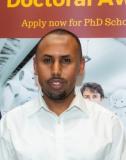ALL Institute: Assisting Living & Learning
ToggleEmma Delemere
Emma's research sought to examine the impact of paediatric cancer on the quality of life of children and their families. In addition, the potential role of connective health technologies to mitigate burden and increase quality of life. Connected Health Technologies are those in which a two-way flow of information is used. This means data is gathered, analysed and returned to the individual in a manner that provides feedback. While Connected Health is increasingly espoused as a solution to burden and health care outcomes for caregiver and health care provider alike, analysis of how it may best meet the needs of families living with and beyond paediatric cancer remains to be examined. This research sought to explore how aspects of treatment and survivorship may impact quality of life and burden experienced by the family, as well as investigating the potential of connective technologies to enhance the quality of life of this group.
Publications:
Delemere, E. & Maguire, R. (2020). The Role of Connected Health Technologies in Supporting Families Affected by Paediatric Cancer: A Systematic Review. Psycho-Oncology.
Dounavi, K.& Delemere, E. (2019). Parent-Implemented Bedtime Fading and Positive Routines In Volkmar, F. (Ed.), Encyclopaedia of Autism Spectrum Disorder, New York: Springer-Verlag.
Delemere, E. & Dounavi, K. (2018). ‘Parent-Implemented Bedtime Fading and Positive Routines for Children with Autism Spectrum Disorder’, Journal of Autism and Developmental Disorders, 48(4), pp1002-1019.

Mohamed Maalin
PhD - Department of Psychology
My research sought to investigate the possibility of establishing an Assistive Technology (AT) Passport as a user focused tool for coordination of AT products and services in Ireland. Some studies suggest that Ireland has a ineffective and highly fragmented national AT system, compared to countries such as Norway, Denmark, the Netherlands, and Germany. The concept of an AT passport has the potential to facilitate a more effective interaction between the individual AT user, and the system required to effectively support that user.
AT is any assistive products and related systems and services, used to promote independent living across settings; at home, in education and work. Access to AT is recognized under the United Nation’s Convention on the Rights of People with Disabilities (UNCRPD 2007) as a human right . As such the ratifying Countries, including Ireland, must ensure measures are taken to incorporate it into current policy and practice. My research aims to identify and establish the requirements for the AT Passport and suggest a framework for its further development, evaluation and potential scalability.
Publications:
Maalim, M. I., McVeigh, J., & Mannanm, H. (2014). Kenya’s vision for an equitable, rights-based health system fails to address specific health needs and barriers to accessing health care of vulnerable populations. Africa policy journal,[Retrieved: Jul. 2015].

